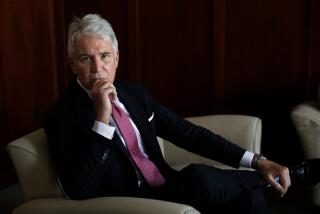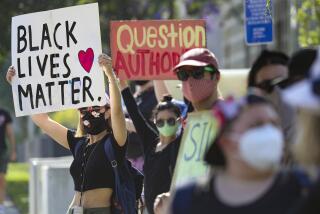Andre Birotte Jr., driven by justice
At the top of the big whiteboard in his office, Andre Birotte Jr. has written “BHAGS,” by which he means his aspirations as U.S. attorney for seven Southern California counties: “big hairy audacious goals.” He’s already hit some audacious personal goals, this son of Haitian immigrants. He’s made his way from the L.A. public defender’s office to inspector general of the Los Angeles Police Department to private practice, and, since 2010, to chief of the most populous U.S. attorney’s district in the nation. Among those BHAGS? Outreach, and a justice-driven department. Maybe the federal indictments of 20 L.A. County sheriff’s deputies on civil rights charges are a sample.
Do you expect more sheriff indictments?
The investigation is ongoing. We go where the evidence takes us.
Are all of those indicted going to trial?
This is high-stakes litigation. When we charge cases, we go in with the assumption that it’s going to trial. We make sure we dot our I’s, cross our Ts and say how is this going to play out to a jury?
Some deputies have volunteered information to your office. Why?
Some think it’s the right thing to do. I think there are some who thought these kinds of matters would not be looked at very seriously by other officials, and I’m speculating, but I gather there may be some who, once the indictments were announced, realized the government was serious and decided maybe it is time to come forward and tell the truth as to what they observed or may know.
Was any kind of deal discussed for or with then-Sheriff Lee Baca?
I can’t comment as [to how] it relates to Sheriff Baca’s sudden and unexpected [retirement]. We have an ongoing investigation; I can’t say more than that.
You were the inspector general for the L.A. Police Commission during the consent decree days. Do you see a big difference in the LAPD now?
A huge sea change. It comes from the leadership; people like Bill Bratton and Charlie Beck helped to steer this into an organization that is equally concerned with accountability and transparency as it is with policing and keeping the community safe. Opening up their door, saying this is who we are, good or bad. That allows the community to see what’s going on and, perhaps more importantly, in times of crisis and tension [the community] is willing to pause before rushing to judgment because they’ve developed that relationship.
What causes law enforcement to abuse its authority?
The overwhelming majority of law enforcement officers are outstanding public servants who put their lives on the line every day. Unfortunately, with a big organization, you have outliers and their motives can vary. It could be their moral compass was not set appropriately from the get-go. Sometimes it can be a financial burden, the stresses of the job. You hear stories where law enforcement officers feel it’s raining, and they feel they need to cut corners to stem the tide. But you can’t break the law to enforce the law. I tell prosecutors here, you come into this job with what I call a reservoir of justice. Your job is to make sure that reservoir is always full. The only way to do that is doing the right thing, the right way, all the time.
How many of your cases originate with federal agencies versus state and local ones?
I’ve got three kids so I use this analogy: We all play in the sandbox well together. We realize it is to our offices’ benefit to come together, particularly when we’re seeing budgets being slashed. Last year, [L.A. County Dist. Atty.] Jackie Lacey and the Montebello police, the FBI, the DEA, announced a takedown of gangs in Montebello. The D.A.’s office has tools we don’t have — [on] homicide cases, they have a wealth of experience. We have RICO [the anti-organized crime law], where we can charge 30 or 40 gang members in a sweeping indictment. In a case like Montebello, they’ll do the homicide cases and we’ll do the rest under RICO. We use postal inspectors and the IRS more than we used to, because there’s often a money component that we can charge — tax charges, money laundering — that has stiff sentences. In the 1990s, it was very much siloed — the FBI did this, the D.A. did this. We’re working much more together now.
Is one advantage of federal prosecution that federal felons serve more of their sentences than state felons?
Absolutely. Realignment has been a big issue. There will be cases where I suspect local law enforcement will say, “If [the feds] prosecute, [they’ll do] 85% of the time — that’s a big chunk of time to keep some dangerous folks away from the community.
You’ve brought civic corruption charges against state legislators and local officials. How do you decide which to prosecute?
I’ve always looked at the Department of Justice as an arm of civil rights and public corruption [policy]. When I became U.S. attorney, one of the first things I did was bring back this district’s public corruption and civil rights sections.
Surely there are more cases than you have the resources to prosecute, so how do you decide?
The needs of the district, in cases that are going to have the biggest deterrent impact. The fraud realm — there may be thousands of schemes going on where, quite frankly, the loss amount is $10,000, $15,000. No small change but given our resources, we’re not going to be able to prosecute that. We use guidelines — something like a case where the loss is a half-million or higher. If there was a case with — I’m just making this up — a $25,000 scheme but the scheme was so pervasive we need to send a message, we do the case. It’s not solely a dollar amount. Our hope is we’ll make someone think, oh boy, the feds are looking at this kind of conduct. With law enforcement, we’ve done consumer protection summits, mortgage fraud summits, human trafficking summits — we hope to get people not to be victims.
The U.S. attorney’s office headquartered in New York City is a hard-charging, Wall Street-busting office that’s produced figures like Rudy Giuliani. What’s different about this office?
New York is the media capital, it’s the [financial] markets, the expectation is that what the U.S. attorney’s office does is news. I like to let the work speak for itself, the good work of the 500 or so people here. The district is so large, we get everything: massive healthcare fraud, financial fraud, environmental crime, piracy cases, violent crime, hate crime; you name it, we’ve got it. We’ve got national security cases, individuals charged with conspiring to provide material support to harm and kill Americans.
I have on my desk a note from Rachel Horne, and a plaque from Gerardo Hernandez’s funeral to remind me what this job is about. [Horne is the wife of Coast Guardsman Terrell Horne III, killed in 2012 in the line of duty; Hernandez, a TSA agent, was killed at LAX in 2013.]
California legalized medical marijuana, and other states legalized marijuana outright. It’s still illegal under federal law. How do you decide whether to prosecute such cases?
Our prosecutions have focused on large traffickers we believe violate both the spirit and intent of California law and federal law. The deputy U.S. attorney general issued a memorandum that outlined eight factors to consider: Are they diverting drugs to kids? Are they diverting drugs across state lines?
We do from time to time get guidance from Washington on issues that have national scope. The AG has been very clear — you need to do what’s right in your district. My colleagues in South and North Dakota, the primary issues are Indian country; they [prosecute] murders and rapes because they happen on federal property. We don’t have that issue. In North Carolina, with Bank of America having moved there, there’s more corporate [cases]. Every district has its unique culture.
You went to law school at Pepperdine — for the weather?
If I’m honest! I’m in New Jersey, freezing my butt off, I see this flier for this school looking out over the ocean. I called the number on the flier and next thing I know I’m on the phone with the dean. I flew to California, no relatives here, no friends. I rented a car, drove to Pepperdine, said, “I want to be a D.A. or a public defender.” They said, “We think we can make that happen for you.” My parents were furious. They said, “Why do you have to go that far? I tease them: “You guys left your country!”
You were a public defender for a while. Why the switch to prosecution?
I was a product of the Court TV era. I used to watch those trials, and I thought I wanted to do both. Both jobs are invaluable in the criminal justice system.
Assistant U.S. attorneys can exercise discretion in a way you can’t as a public defender. A case [of] a woman charged with robbing a bank — I got a sense something was off. Bottom line, she was in an abusive relationship. She was the getaway driver. We worked out a disposition where she pleaded guilty to being an accessory after the fact and didn’t have to go to jail. About a year later, this woman comes up to me: “You gave me a break.” She was out of that relationship, being productive. Those things, you think about. You do have a lot of discretion.
What have been your best and worst days on the job?
The day [a man] walked into the airport and shot Gerardo Hernandez, and certainly the day Terrell Horne was killed.
Best days, I jokingly say this job is [like going] to Six Flags, getting on the wildest roller coaster ride that takes you all over the place, and you get on it again the next day. A Haitian kid from New Jersey, and I’m the U.S. attorney for the central district of California — what’s not to like? I’m a schmuck from New Jersey and I’ve got a picture with the president — how does that happen?
This interview was edited and excerpted.
Twitter: @pattmlatimes
More to Read
A cure for the common opinion
Get thought-provoking perspectives with our weekly newsletter.
You may occasionally receive promotional content from the Los Angeles Times.






